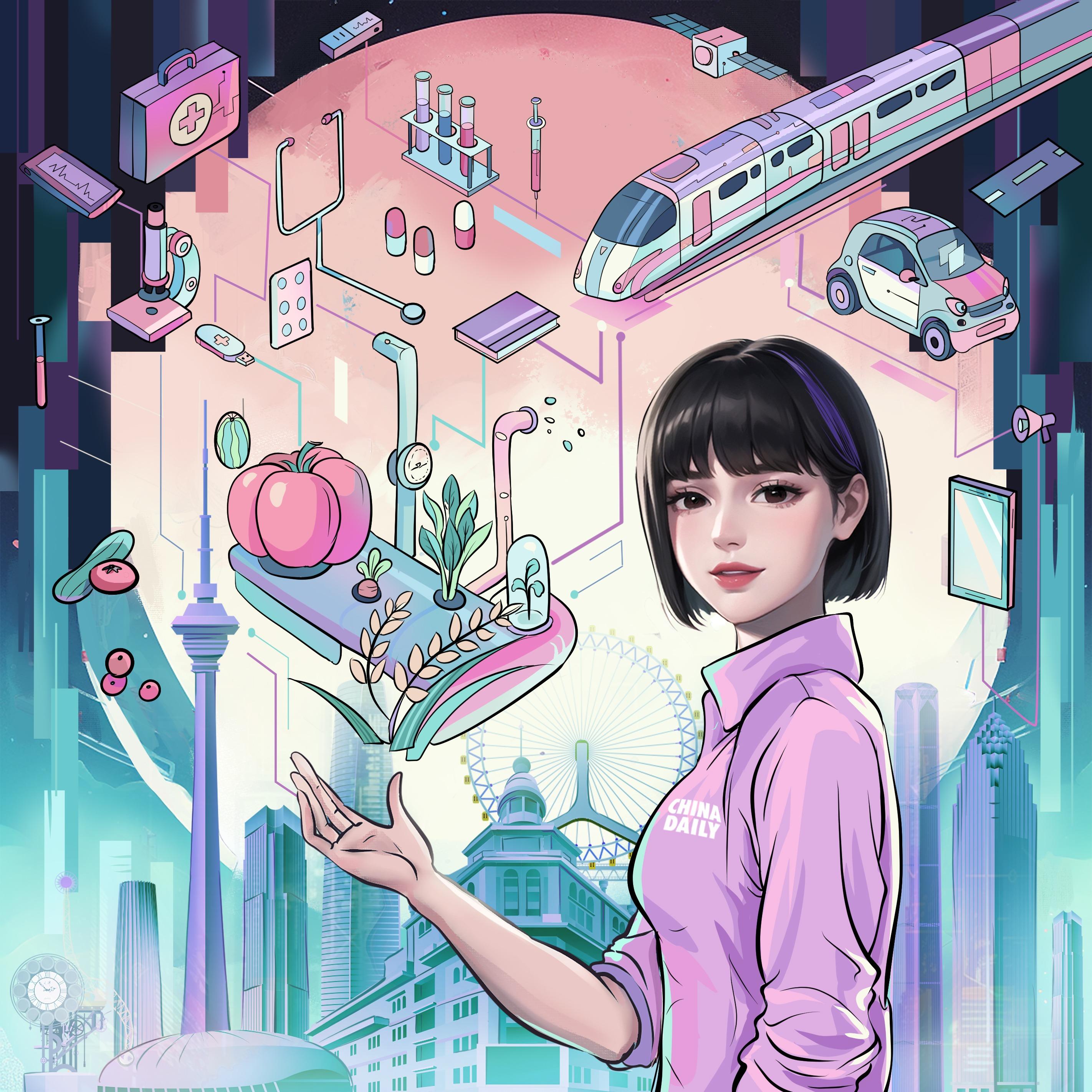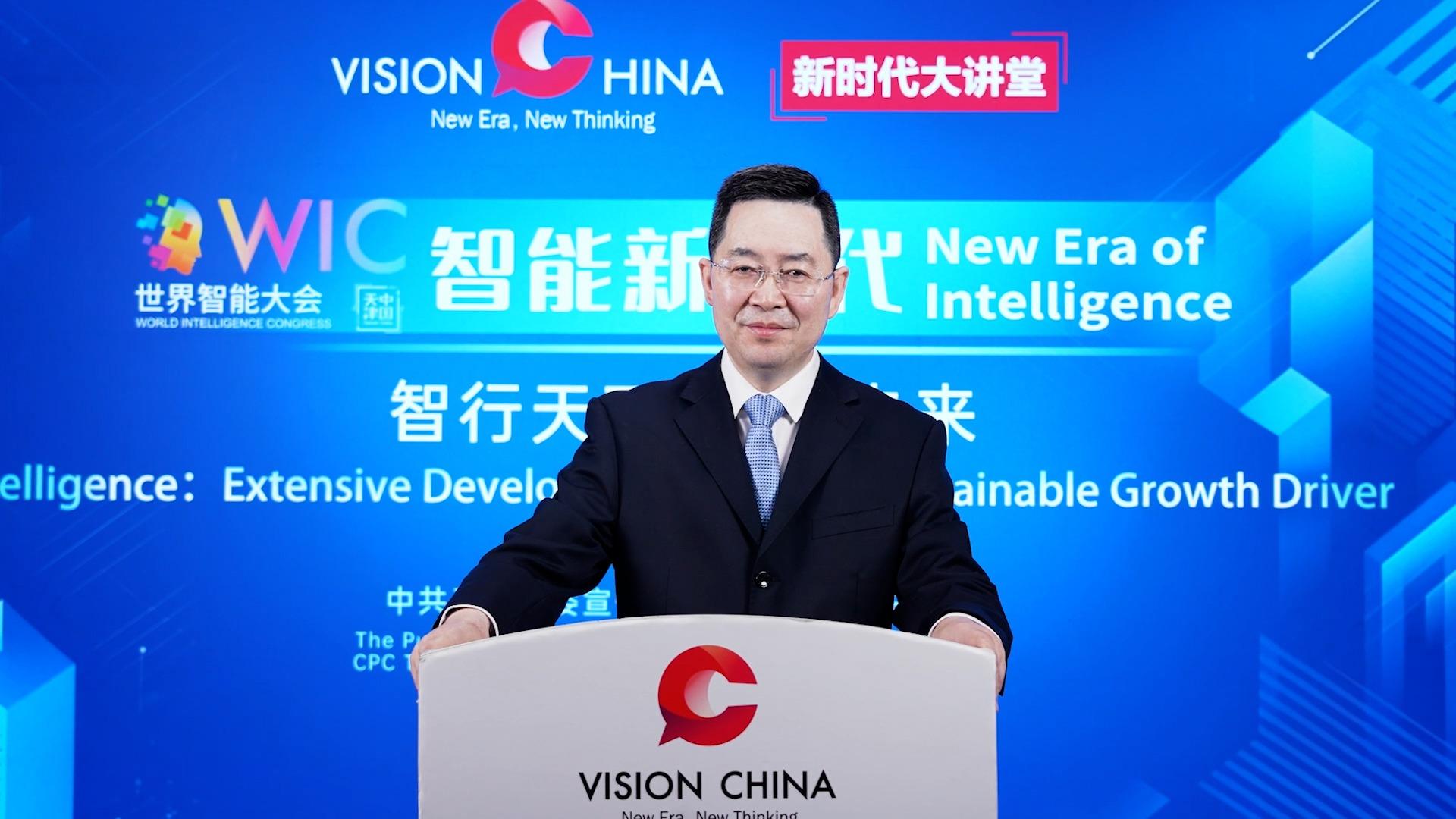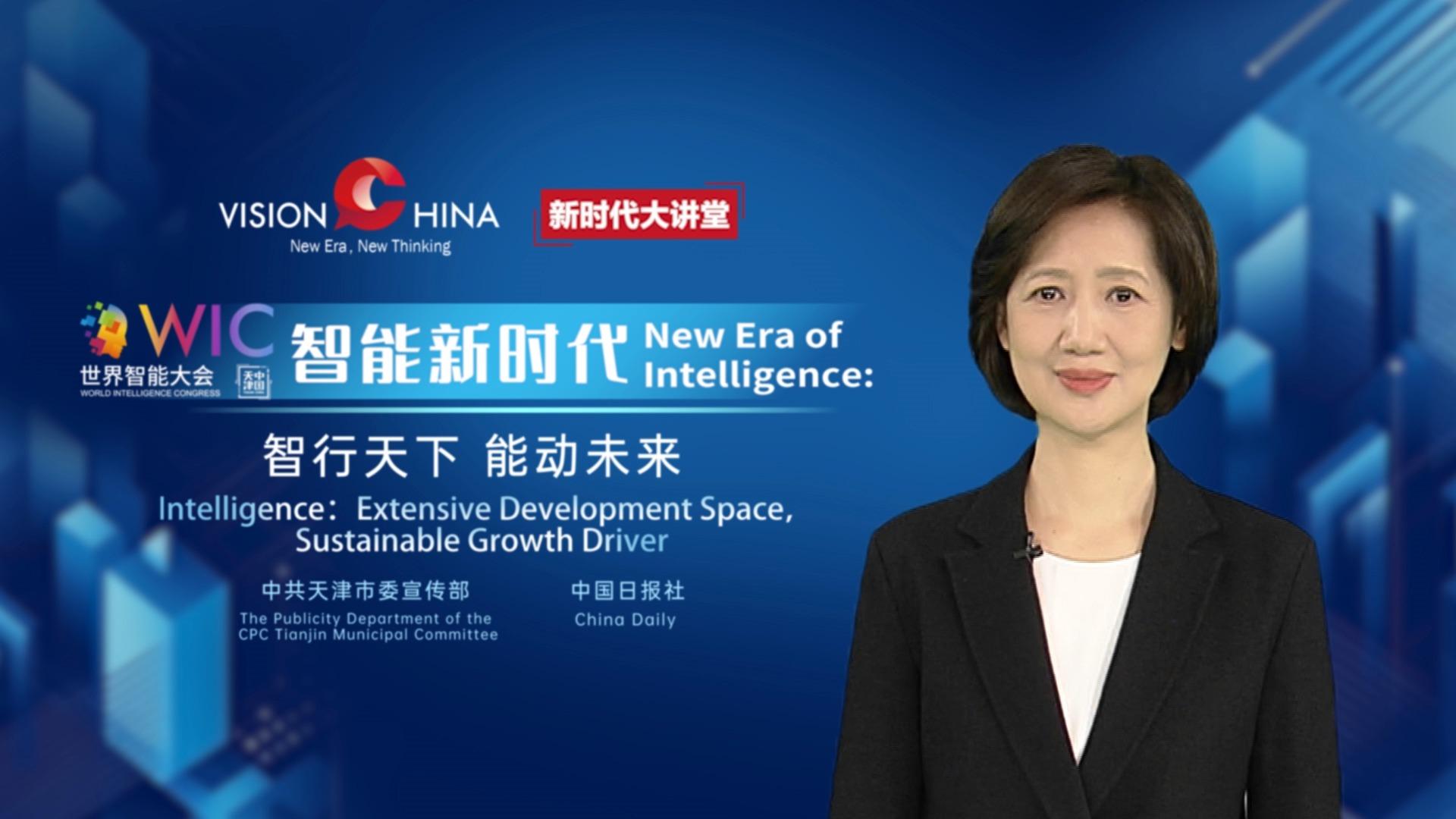Speeches focus on technology's ability to drive economies, create dialogue
 (MA XUEJING / CHINA DAILY)
(MA XUEJING / CHINA DAILY)
As digital technology becomes a pioneering force in driving the global technological revolution and industrial transformation, more effort is needed to allow intelligent technology to promote the national goal of the "building of a community with a shared future for mankind", according to Qu Yingpu, publisher and editor-in-chief of China Daily.
Speaking at the Vision China event on Thursday, Qu said that artificial intelligence, represented by ChatGPT, in particular, has become a buzzword, and many foreign experts believe that its advent is as important as the arrival of the PC or the internet.
An acronym for "Chat Generative Pre-trained Transformer", ChatGPT is an AI chatbot developed by OpenAI, a company based in the United States. It has wowed the world with its ability to take on a variety of tasks such as writing essays, debugging programs and making business plans, abilities that differentiate it from earlier, more narrowly focused AI projects that excelled in only one area.
Though different views on GPT exist, it is widely hoped that the latest technology will play a "positive and proactive" role in improving well-being, Qu said.
According to him, this potential can be fully leveraged to promote the "building of a community with a shared future for mankind", a concept first proposed by President Xi Jinping in March 2013. "In the future, we should give full rein to the role of intelligent technology in implementing the 'Three Initiatives' proposed by President Xi, " Qu added. This refers to the Global Development Initiative, the Global Security Initiative and the Global Civilization Initiative.
He made the comments as global economic recovery faces challenges, with problems including the disparity in development, dilemmas of governance, the digital divide and the equity deficit becoming more prominent. Concerns also exist that a new digital divide may emerge in the intelligent era.
"We should bridge the digital divide and create cohesiveness for the implementation of the Global Development Initiative," Qu said.
The publisher highlighted the fact that more effort is needed to nurture new drivers of economic growth in the post-epidemic era and create an open, fair, just and nondiscriminatory environment for scientific and technological development.
While praising the convenience and potential dividends that intelligent technology offers humanity, Qu also acknowledged that it is a double-edged sword and may create many challenges, as well as ethical issues.
"We should improve global governance of science and technology, and ensure intelligent technology evolves in the right direction to provide a strong pillar for global security," Qu said.
 Qu Yingpu, publisher and editor-in-chief of China Daily, speaks at the Vision China event in Tianjin. (PHOTO PROVIDED TO CHINA DAILY)
Qu Yingpu, publisher and editor-in-chief of China Daily, speaks at the Vision China event in Tianjin. (PHOTO PROVIDED TO CHINA DAILY)
In February, the Chinese Foreign Ministry published The Global Security Initiative Concept Paper, which called for greater effort to strengthen international governance of AI and other emerging technologies to prevent potential security risks.
An analysis of the legislative records of 127 countries shows that the number of bills containing the term "artificial intelligence" that were passed into law grew to 37 last year from just one in 2016, according to the AI Index Report 2023 produced by Stanford University.
"AI has moved into its era of deployment; throughout 2022 and the beginning of 2023, new large-scale AI models have been released every month," Jack Clark, co-director of the Stanford Institute of Human-Centered Artificial Intelligence, wrote in the report.
"Given the increased presence of AI and its potential for massive disruption, we should all begin thinking more critically about how exactly we want AI to be developed and deployed."
As intelligent technology injects new vitality into global development, Qu also highlighted the importance of promoting exchanges to empower the implementation of the Global Civilization Initiative.
"We should further tap into the potential of intelligent technology and explore scenario-based, smart applications of cutting-edge technology to build new platforms for dialogue among civilizations, and for cross-cultural communication," Qu said.
By way of example, China Daily set up the MetaTime studio last year, which combines research from major projects such as the national project to trace the origins of Chinese civilization, and new technology such as the metaverse, to showcase the charm and significance of China's traditional culture and show the world a credible, attractive and respectable China.
The move resonates with the public's growing enthusiasm for AI. Citizens from China, Saudi Arabia and India are among those who feel the most positively about AI products and services, according to a survey of nearly 20,000 adults from 28 countries by Ipsos, a global market research group.
About 78 percent of Chinese respondents, the highest proportion among surveyed countries, agreed with the statement that products and services using AI have more benefits than drawbacks.
This was followed by Saudi Arabia (76 percent) and India (71 percent), Ipsos added.
 Shen Lei, a member of the Standing Committee of the Communist Party of China Tianjin Municipal Committee and head of the committee's Publicity Department, addresses the latest Vision China event in Tianjin on Thursday. (PHOTO PROVIDED TO CHINA DAILY)
Shen Lei, a member of the Standing Committee of the Communist Party of China Tianjin Municipal Committee and head of the committee's Publicity Department, addresses the latest Vision China event in Tianjin on Thursday. (PHOTO PROVIDED TO CHINA DAILY)
Tianjin striving to become high-tech hub
By Fan Feifei
With emerging digital technologies like artificial intelligence expanding rapidly around the world, the northern port city of Tianjin plans to bolster efforts to promote development through technological innovation and opening-up, as well as education, technology and a strong workforce, a local senior official said.
Shen Lei, a member of the Standing Committee of the Communist Party of China Tianjin Municipal Committee and head of the committee's Publicity Department, said that in today's world, a new wave in the information technology revolution is in full swing, bringing profound change to industrial development.
"Data, algorithms and computing power have become crucial factors in determining the overall competitiveness of a region or country," she said at the latest Vision China event held on Thursday night.
"We need to harness the power of the new generation of artificial intelligence to drive technological innovation, upgrade industries and boost productivity."
Shen stressed the need to foster advantages in industrial development by vigorously developing the digital economy, accelerating the industrialization of digital technologies and the digital transformation of industries, and promoting the in-depth integration of the internet, big data and artificial intelligence with industries.
During the first quarter of this year, Tianjin's economy showed significant improvement and accelerated growth, with its GDP expanding by 5.5 percent year-on-year to 371.5 billion yuan ($53.3 billion) during the period.
The city's industrial output — a gauge of activity in the manufacturing, mining and utilities sectors — rose by 3.1 percent in the January-March period from a year earlier, after a 1.5 percent rise in the first two months.
Tianjin is shaping up to become a high-tech hub and has rolled out a series of policies to develop the AI sector. It has set up a special fund of 10 billion yuan for intelligent manufacturing, and a 100-billion-yuan industry fund for the new generation of artificial intelligence.
Shen said that as a megacity with over 10 million people and a rich cultural heritage, Tianjin occupies a strategic position in national development and boasts regional, industrial and resource advantages that can help it achieve growth.
She emphasized that Tianjin will deepen reform and opening-up, create a world-class business environment that is market-oriented, law-based, and internationalized, and set up a high-level platform for opening up.
Noting education, science and technology, and human resources as the foundational and strategic pillars for creating a modern socialist country in all respects, Shen said Tianjin will implement its action plan to develop the city through science, education and a highly-skilled workforce.
"This involves close integration between education and industry, between science and the economy, and between workforce building and development, and we shall create a sustainable competitive advantage for Tianjin by turning it into a city with high-quality education, a hub for scientific and technological innovation, and an open platform for attracting top talent," she said.
The Tiankai Higher Education Innovation Park also officially opened on Thursday. Shen explained the name "Tiankai" not only represents the collaboration between the two renowned century-old universities of Tianjin University and Nankai University, but also embodies the idea of revitalization.
The park aims to become a source of scientific and technological innovation, promoting the commercialization of scientific and technological breakthroughs, and the integrated development of innovative industrial chains.


